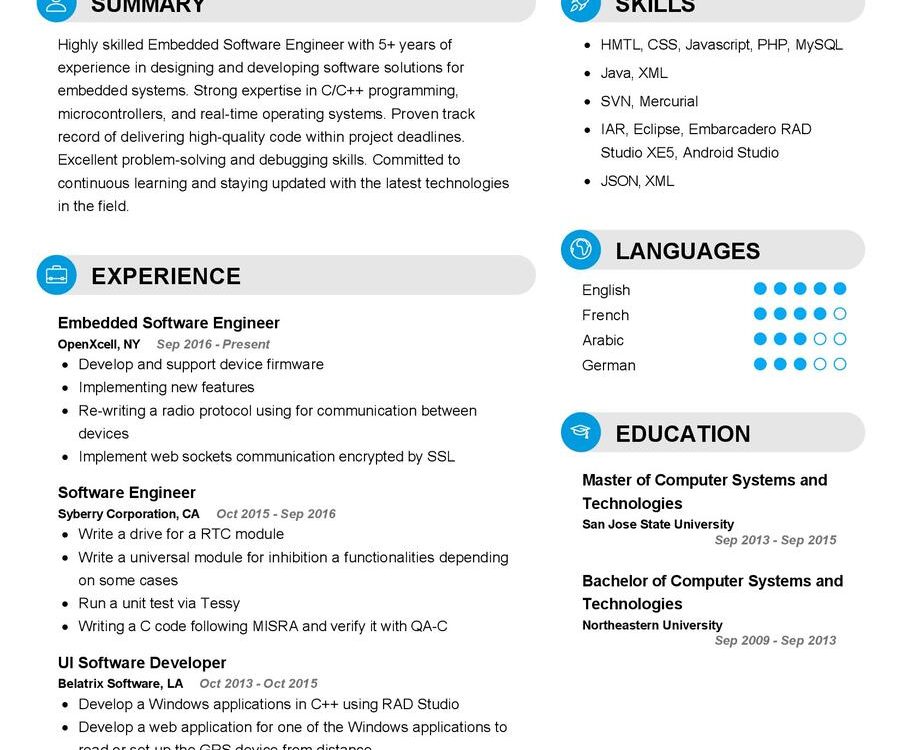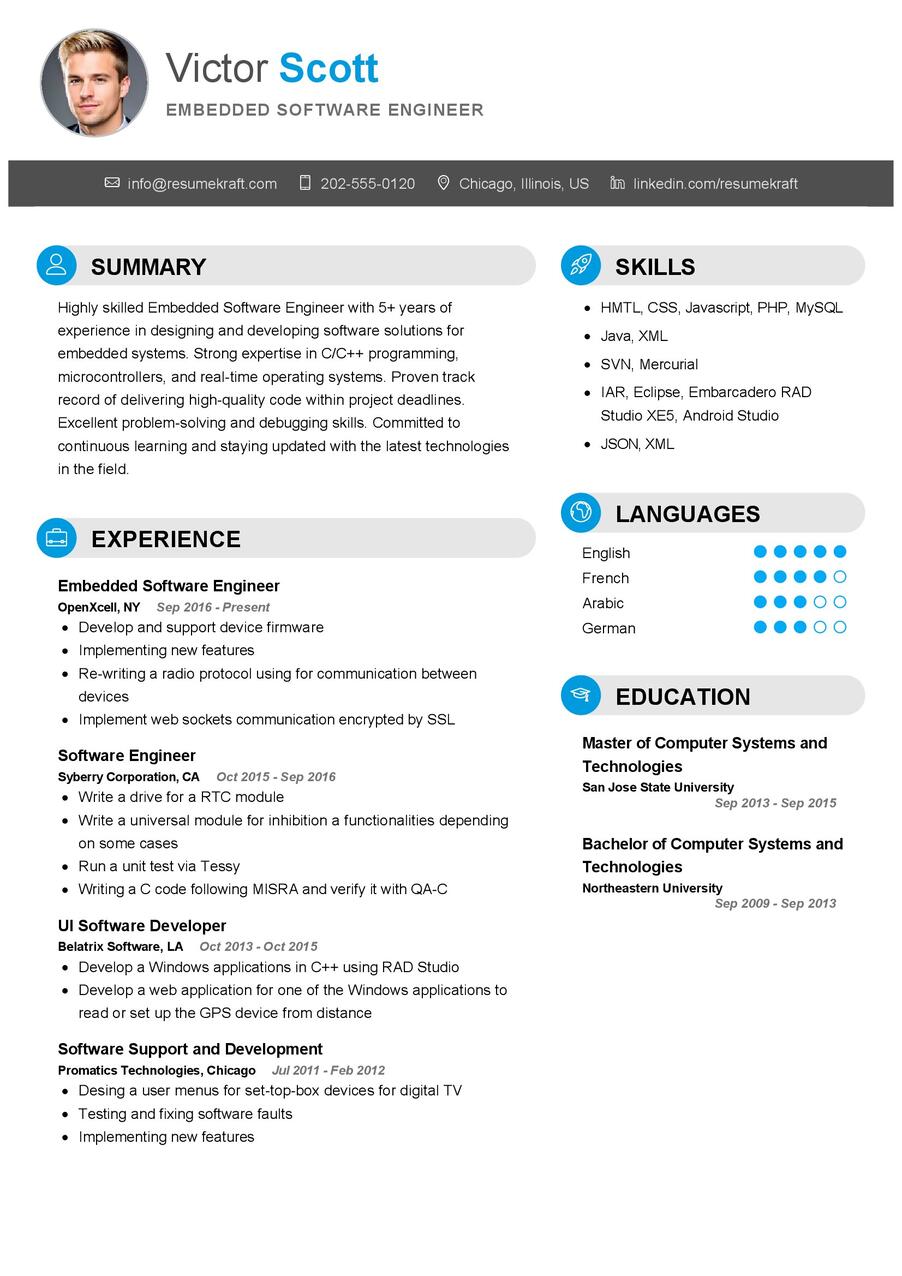Exploring the Role of an Embedded Software Engineer
The landscape of technology is ever-evolving, and at the core of many innovations is the Embedded Software Engineer. This role is a dynamic blend of technical expertise and problem-solving prowess, playing a crucial part in the development of embedded systems. In this article, we will delve into the multifaceted responsibilities, job requirements, and key skills that define the role of an Embedded Software Engineer.
Understanding the Job Requirements
Becoming an Embedded Software Engineer requires meeting a set of specific requirements, showcasing a journey of continuous learning and hands-on experience. Let’s delve into the prerequisites one needs to fulfill to step into the shoes of an Embedded Software Engineer:
- A Bachelor’s or Master’s degree in Computer Science, Electrical Engineering, or a related field, laying a strong foundation in the technical domain.
- Proficiency in programming languages like C and C++, crucial for embedded systems development.
- Experience in real-time operating systems (RTOS), demonstrating the ability to work in time-sensitive environments.
- Understanding of hardware-software integration, a skill vital for seamless collaboration with hardware engineers.
- Knowledge of debugging tools and techniques, honed through practical experience in identifying and resolving software issues.
- Strong analytical and problem-solving skills, essential for tackling the complexities of embedded systems.
Additional certifications in embedded systems or related technologies can significantly enhance your profile in the competitive job market.
Roles and Responsibilities of an Embedded Software Engineer
The role of an Embedded Software Engineer is a tapestry of diverse responsibilities, requiring technical acumen and a strategic approach. Let’s unravel the core responsibilities that define this role, each one contributing to the creation of innovative embedded systems:
- Designing and developing embedded software for various applications, ensuring functionality and efficiency.
- Collaborating with hardware engineers to integrate software with hardware components, fostering seamless communication.
- Conducting thorough testing and debugging of embedded systems, identifying and resolving software issues.
- Optimizing code for resource-constrained environments, ensuring optimal performance of embedded systems.
- Participating in the full software development life cycle, from requirements analysis to system integration.
- Staying updated with emerging technologies in embedded systems, guiding the team towards adopting best practices.
Each responsibility presents unique challenges and opportunities for growth, shaping you into an expert in embedded software engineering.
Crafting an Impressive Embedded Software Engineer CV
Your CV is a crucial tool in presenting your skills and experiences to potential employers. Here are some tips to create a standout Embedded Software Engineer CV:
- Highlight specific projects where you played a key role in the design and development of embedded systems.
- Showcase your expertise in programming languages, emphasizing your proficiency in C and C++.
- Quantify your achievements where possible, such as improving system efficiency or reducing debugging time.
- List any relevant certifications or training programs you’ve completed in embedded systems or related fields.
- Customize your CV for each application, aligning your skills with the specific requirements of the job.
Your CV is not just a document; it’s your personal marketing tool, showcasing your unique value as an Embedded Software Engineer.
Embedded Software Engineer CV Summary Examples
Your CV summary is the first impression you make on potential employers. Craft a powerful snapshot of your career, encapsulating your experiences, skills, and the value you bring to the table. Here are some examples to inspire you:
- “Experienced Embedded Software Engineer with a proven track record in developing efficient and reliable embedded systems, adept at collaborating with cross-functional teams for successful project delivery.”
- “Innovative Embedded Software Engineer with a passion for optimizing code and enhancing system performance, bringing a strong analytical mindset to every project.”
- “Dedicated Embedded Software Engineer with expertise in real-time operating systems, contributing to the seamless integration of software and hardware components for mission-critical applications.”
Each summary is a window to your career, offering a glimpse of your journey, your strengths, and your vision as an Embedded Software Engineer.
Building a Robust Experience Section for Your Embedded Software Engineer CV
Your experience section is the heart of your CV, narrating the story of your career and showcasing your growth. Here are some examples to guide you in building a strong experience section:
- “Led the development of embedded software for a medical device, ensuring compliance with industry standards and achieving a 15% improvement in system efficiency.”
- “Collaborated with hardware engineers on a smart home automation project, contributing to the successful integration of software with IoT devices.”
- “Played a key role in the optimization of code for an automotive control system, resulting in a 20% reduction in debugging time.”
Each experience is a chapter in your career story, highlighting your contributions and successes as an Embedded Software Engineer.
Educational Background for Your Embedded Software Engineer CV
Your educational journey is the foundation of your expertise. Showcase your academic achievements to strengthen your CV:
- Master of Science in Computer Engineering, XYZ University, a comprehensive program that deepened my understanding of embedded systems, 2017.
- Bachelor of Technology in Electrical Engineering, ABC University, the foundation of my technical knowledge, 2015.
- Embedded Systems Certification, Institute of Embedded Technology, a specialized program enhancing my skills in embedded software development, 2018.
Each educational qualification is a stepping stone, contributing to your proficiency as an Embedded Software Engineer.
Key Skills for Your Embedded Software Engineer CV
Your skill set is your toolbox, equipped with a diverse range of tools honed over the years. Showcase your abilities effectively:
Soft Skills:
- Analytical thinking, essential for troubleshooting and optimizing embedded systems.
- Effective communication, facilitating collaboration with cross-functional teams.
- Attention to detail, crucial for identifying and resolving software issues.
- Adaptability, enabling you to thrive in a dynamic and evolving technological landscape.
- Team collaboration, fostering a cooperative environment for successful project delivery.
Hard Skills:
- Proficiency in C and C++, the backbone of embedded software development.
- Experience with real-time operating systems (RTOS), crucial for time-sensitive applications.
- Debugging tools and techniques, honed through practical experience in resolving software issues.
- Knowledge of hardware-software integration, ensuring seamless collaboration with hardware engineers.
- Full software development life cycle (SDLC) knowledge, guiding you through the end-to-end development process.
Each skill is a tool, aiding you in creating efficient and reliable embedded systems.
Common Mistakes to Avoid When Writing an Embedded Software Engineer CV
Avoid common pitfalls to ensure your CV stands out. Here are some mistakes to steer clear of:
- Using a generic CV for every application, failing to tailor it to the specific job requirements.
- Focusing solely on job duties rather than highlighting your achievements, resulting in a lack of depth in your CV narrative.
- Neglecting to include a cover letter, missing an opportunity to provide additional context to your application.
- Overloading your CV with technical jargon, which may obscure your value to non-technical hiring managers.
- Skipping the proofreading process, which can impact your professional image.
Avoid these mistakes to craft a CV that is both authentic and compelling.
Key Takeaways for Your Embedded Software Engineer CV
As we conclude this comprehensive guide, here are key points to remember while crafting your Embedded Software Engineer CV:
- Emphasize your specific contributions to embedded software projects, showcasing your impact on system efficiency and functionality.
- Highlight your proficiency in programming languages, especially C and C++, as well as your experience with real-time operating systems.
- Quantify your achievements where possible, providing concrete evidence of your contributions to project success.
- Include a section on continuous learning, showcasing any certifications or training programs you’ve completed in the field.
Finally, feel free to utilize resources like AI CV Builder, CV Design, CV Samples, CV Examples, CV Skills, CV Help, CV Synonyms, and Job Responsibilities to create a standout application and prepare for the Embedded Software Engineer job interview.
Armed with these insights and tips, you are now ready to craft a CV that is a true reflection of your journey, your skills, and your aspirations. Remember, your CV is not just a document; it is a canvas where you paint your career story, a story of growth, learning, and expertise. Best of luck!


